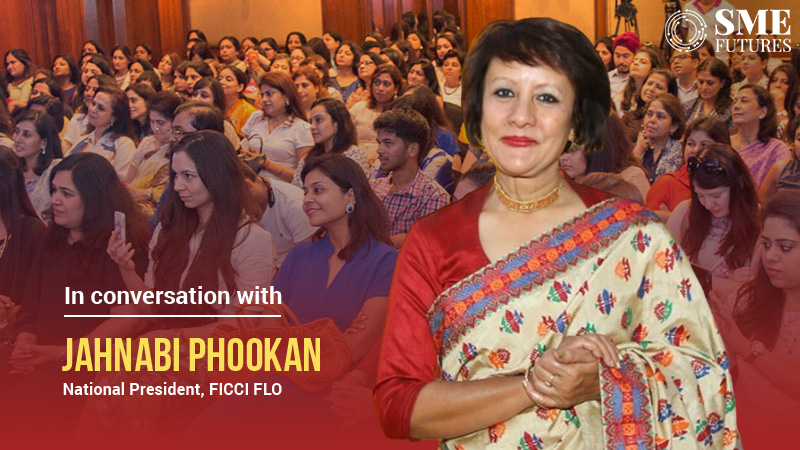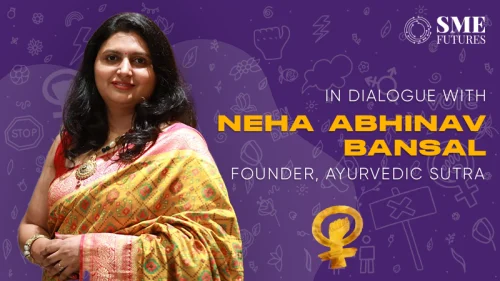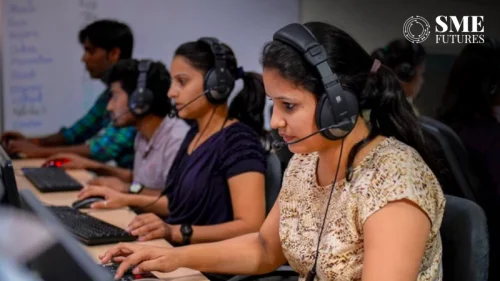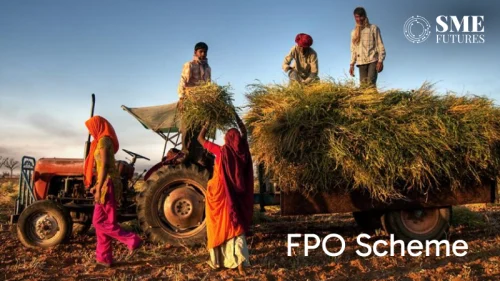Jahnabi Phookan, National President, FICCI FLO, the women’s wing of FICCI, an apex industry body says, “In my opinion #ChooseToChallenge is a direct signal to women that now is the time for us to break through the barriers and shackles which have been holding us down. It’s time for us women to take control of our lives and our decisions and break the glass ceilings which exist in our minds and in the society that we live in as no one else is going to do that for us.”
With years of experience in the business world, Phookan is an entrepreneur and a co-founder of two National Tourism Award-winning companies: Jungle Travels India and Assam Bengal Navigation Company under the JTI Group. She is well known for her work in Northeast India and is responsible for setting up the FLO Northeast chapter as its Founder Vice Chairperson, in 2007.
Focused to empower Indian women, Phookan as president of FLO is working on establishing new growth avenues for women with entrepreneurship capabilities and professional excellence that will enable them to take up new challenges and avail of new opportunities in the digital age. In a conversation with SME Futures, she discusses the work being done during the pandemic and the priorities of FICCI FLO this year.
Edited Excerpts:
2020 ushered in the single greatest crisis in the world and we watched as many of the world’s women were forced out of the labour market, experienced increased domestic violence, and even more disproportionately shouldered the bulk of care giving. Your thoughts on the state of women entrepreneurship in 2021?
The world as of now continues to battle with the COVID-19 pandemic. In 2020, it took the world by surprise and the impact of it on women has been unparalleled. Notwithstanding the fact that women have had to face greater difficulties due to the pandemic, I would like to focus on the upsides that have been brought to light in its wake.
The pandemic gave a significant boost to the digital revolution in India. We are witnessing the growth of the homepreneurs and increasing recognition of the women entrepreneurs in our country today.
I am positive that 2021 will bring about an upturn for women due to the women-centric and gender-responsive efforts made in this regard in this year’s financial budget.
You assumed office as FICCI FLO president last year in the middle of the pandemic. What is your strategy and focus area for this year?
My mission as FLO’s National President has been to work towards sustainable practices and sustainable livelihood to uplift women economically. With Covid19 upon us, sustainability has taken centre stage.
Our work is aligned with the Sustainable Development Goals, especially our work towards gender equality.
FLO has always worked for women at three levels- grassroots, urban and the corporate level. The objective has been to create sustainable economic possibilities for women at all these levels in these uncertain times engendered by the pandemic.
A lot of women have started their businesses during the lockdowns to support their families financially. How is FICCI FLO supporting such women in setting up their business models and providing them with aid in financial matters?
To address women who have recently started their businesses, FICCI FLO has two national level initiatives titled—FLO Mentorship Cell and FLO Incubation Cell, aligned to this cause. The aim is to create a Self-reliant Entrepreneurial Ecosystem for FLO members and by FLO members.
With the FLO Mentoring Cell, for the first time, we have a registered pool of 100+ mentors as well as an enthusiastic pool of mentees for cross mentoring across chapters. Besides the other prestigious MOUs signed with various institutions, I would especially like to mention the National level collaboration that we have signed with Virginia Tech of USA’s India Research and Education Forum (VTIREF).
Under this Mentor Development Program (MDP), VTIREF shall train members / potential mentors who have been identified and recommended by FLO every month.
On the other hand, the FLO National Incubation Cell has a very specific purpose to develop a framework that softens the sharp learning curve that a young start-up has to deal with. Currently, we have 187 members pan India who are keen to evaluate incubation for their business growth and to achieve their goals.
Digital transformation is at the centre stage of the economy with the new normal. What are the initiatives taken so that more women can become digital literate?
On this front, we are collaborating with NSDC’s eSkill India to provide digital training for women by hosting a series of live-interaction webinars to train skill-seekers on basic digital skills and MS technologies, along with sessions on emerging technologies too.
We took up our Adopt ITI Programme (AITIP) programme in all our 17 chapters. Mentorship and apprenticeship / internship are the value additions we seek to provide beyond the technical education received by the students. We had a tremendous response to our first online training offered by a private foundation on a basic course in building businesses, with 2500 students enrolling in the first 3 batches of this certified course.
With NSDC, FLO also plans to reach out to the vast numbers of educated, unemployed women sitting at home by launching online skill development programmes customised for women with entrepreneurial aspirations.
Keeping in mind the rampant cybercrimes against women, we also organised a two-day interactive online workshop on cyber bullying and internet safety exclusively for teachers, namely—Teach Them Young.
Along with many other issues, the crisis of 2020 also highlighted cases of mental health issues and their severity. Are there any initiatives by FICCI FLO in this regard?
During the pandemic it had become more critical than ever to help women with their mental health. And as an attempt to address this challenge we worked on programmes to deliver psycho-social training to women. We did this by broadcasting inspirational stories through our eminent women’s series and through radio as well, which created a positive ripple effect amongst women.
You were one of the founding members of the North-east chapter of FICCI FLO. Tell us about the issues that women there continue to face.
Throughout my life as an entrepreneur, I have never considered anything as an obstacle or a challenge; rather, I have seen it as an opportunity for change.
When I became the founder vice-chairperson of FICCI FLO Northeast Chapter in 2007, I looked upon it as an opportunity for growth as there was no FICCI in the Northeast then. FLO members were enthused, and we saw the potential of what a women’s chamber of commerce could bring to the Northeast and we tried to work towards it.
As far as the challenges faced by women in the Northeast are concerned, they do have to face the hurdles posed by a lack of infrastructure and an underdeveloped market.
The good news is, women in the region are doing better in the spheres of public health, education, and literacy. The sex ratio is also higher than the national average. Women are welcome here in the workspaces and their engagement right from the grassroots to the urban business hubs is substantial. The gap that needs to be worked upon is their role in decision making processes and politics, an issue which women in most parts of the country are still battling with.
As the first president of FLO from the Northeast I have tried to address issues of women in this region and the nation to the best of my capacity.
What about the comments on the low participation of women in boardrooms? Where are we lacking?
In a study by FICCI, women accounted for only 16.9 per cent (1898) out of a total of 11,251 directors till December 2019. A mere 76 companies (4.3 per cent) have appointed three or more women directors.
There is a clear need-based gap for women board members in getting industry exposure and opportunities to create an on-ground impact.
At FLO, we have taken steps in this direction by actively promoting online training on Women Corporate Director programmes through IIM Bengaluru for our members.
Besides that, generally speaking, women have always been at the receiving end of gender stereotypes within Indian society for generations now. And this is further compounded by factors such as mental harassment, sexual harassment, discrimination in the workplace, lack of safety, lack of family support, job insecurity etc. as these issues still persist in India. These factors hinder the growth of women. It is vital to bring about fundamental changes to the attitude of employees, family members and the public.
As an entrepreneur, you have had a fair share of experiences. What are the important lessons that you have learnt during this journey?
As a women entrepreneur life has taught me various lessons. But the key lessons were to seek out new and better opportunities, being creative and having a positive attitude towards the various situations which life puts in front of us. Also, the journey taught me to develop a consistent habit of grabbing and learning from these experiences. And last but not the least, to never be afraid of failures because with each failure we learn an invaluable lesson, and this lays down the foundation of our success story.
What advice would you like to give to young women who are thinking about their careers with the help of our platform?
My advice to all the young women out there thinking about their careers or for those who are already pursuing their dreams is to always believe in yourself. Never stop fighting for your dreams.
There will be moments when you feel both physically and mentally drained but continuing to fight for your dreams during such moments is what will help you harness the true potential you possess. Do not ever let the thought of failure consume you. Always try to improve yourself and explore your potential in different fields of work and learn from your experiences as it would help you to build an arsenal of skills which will play a key role in making your personal and professional life better.











